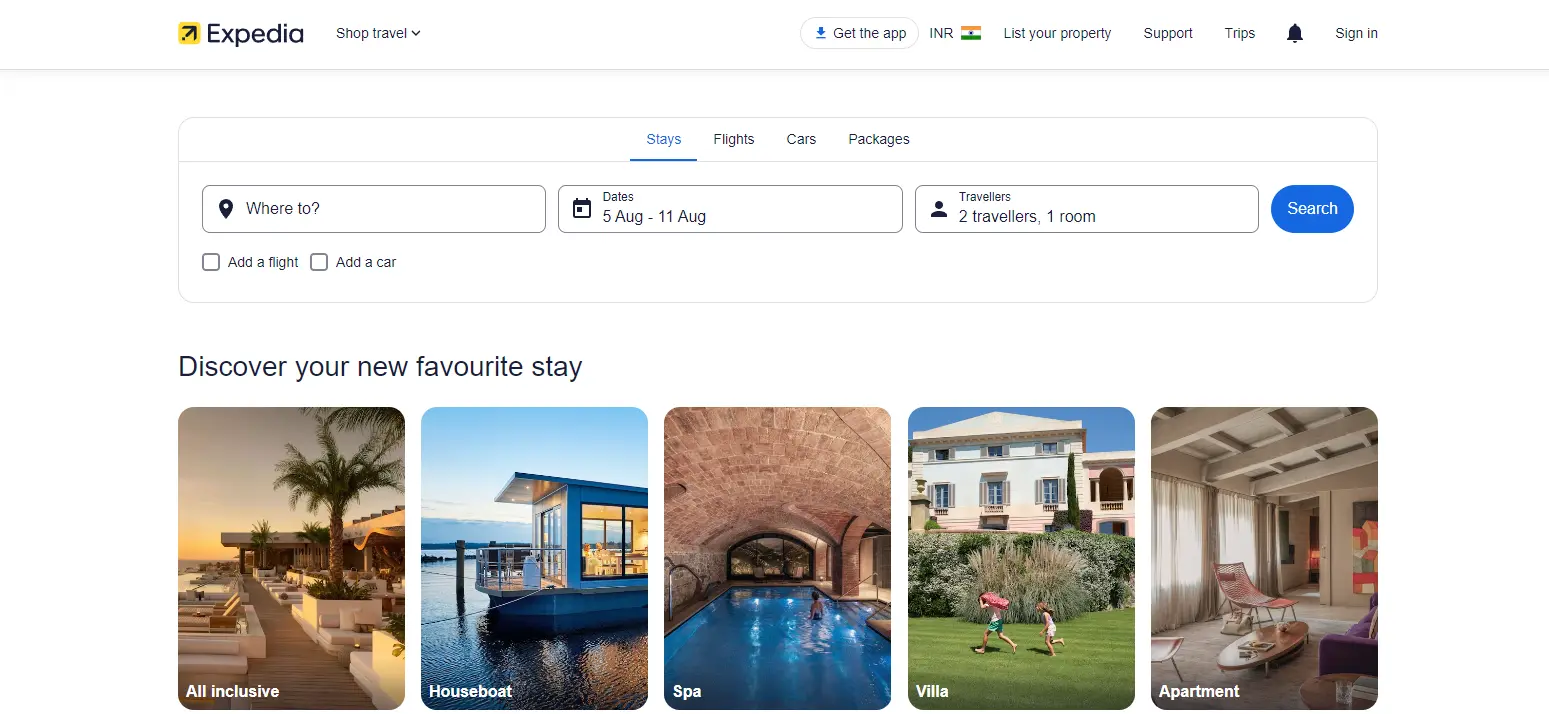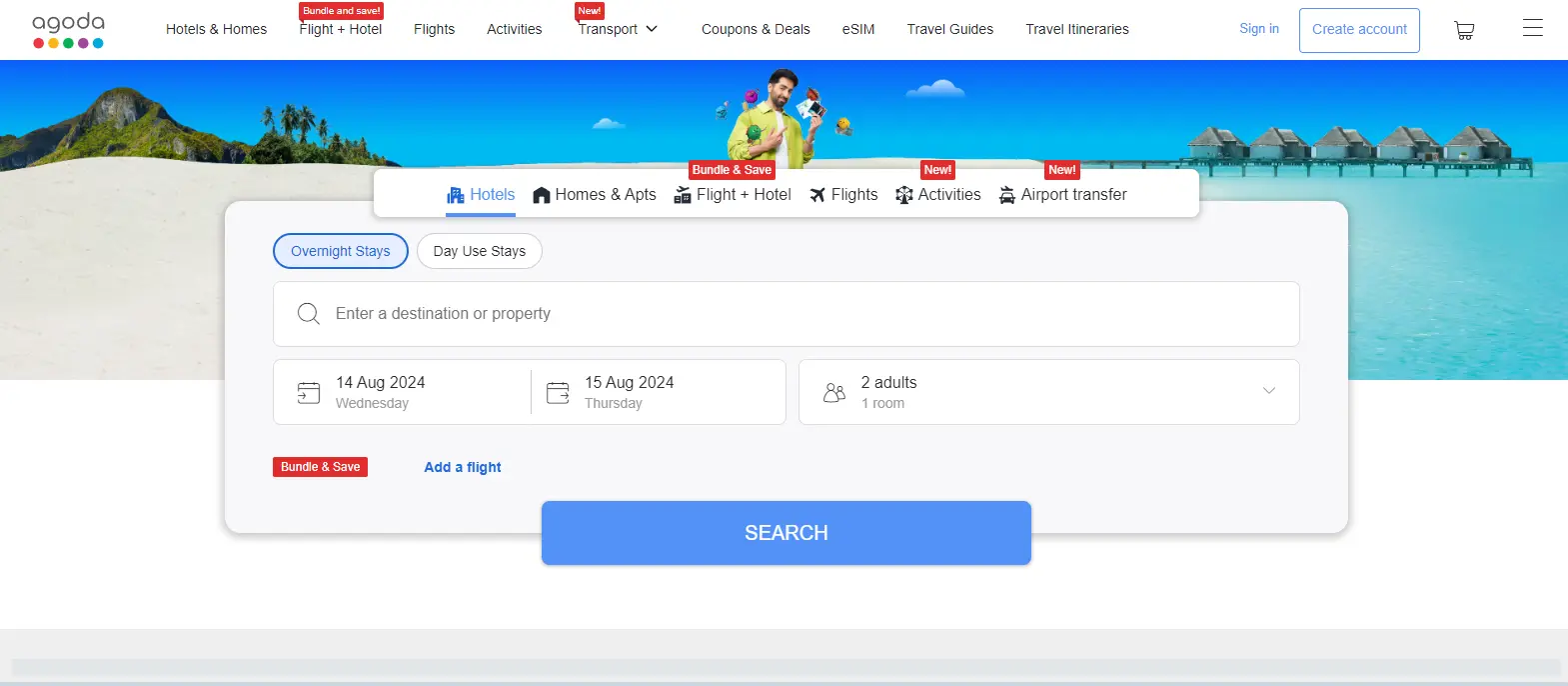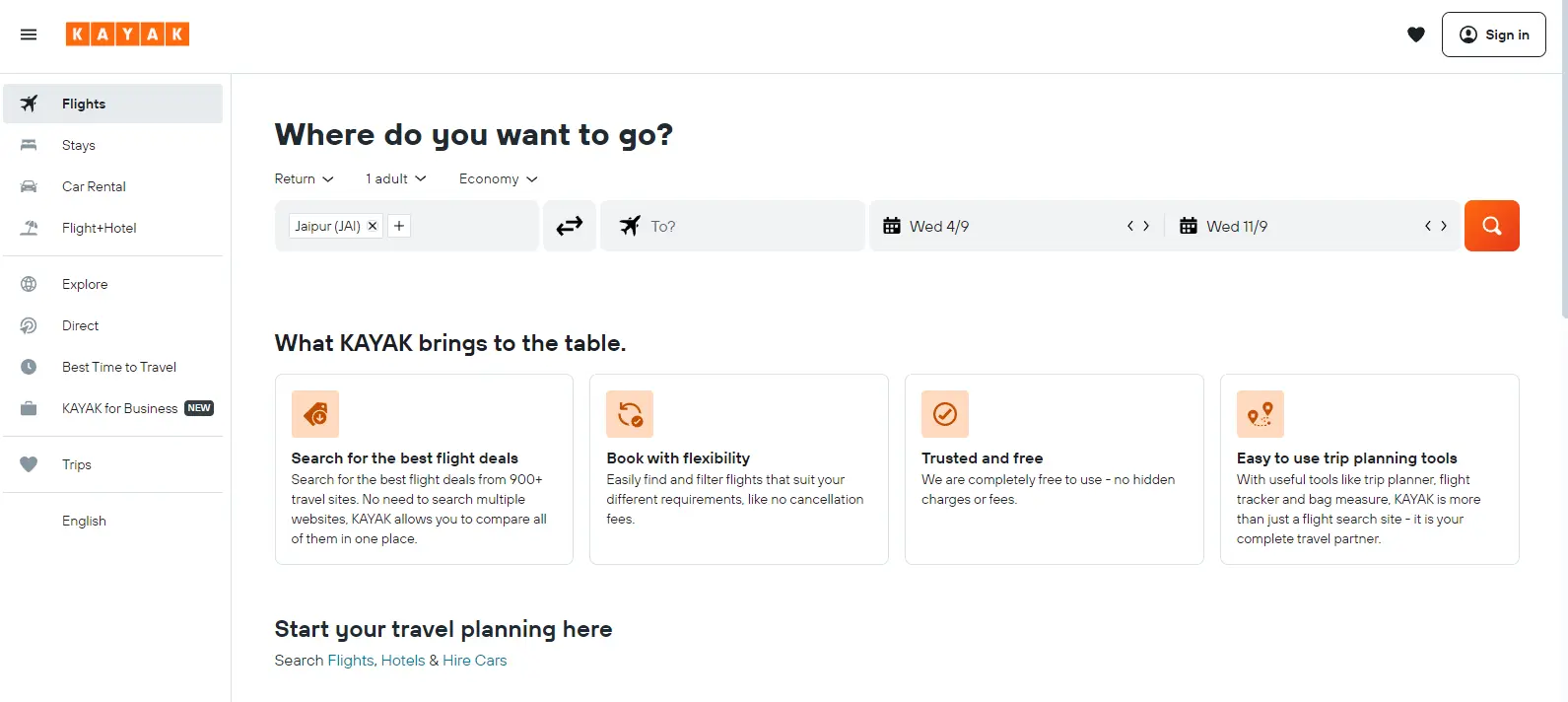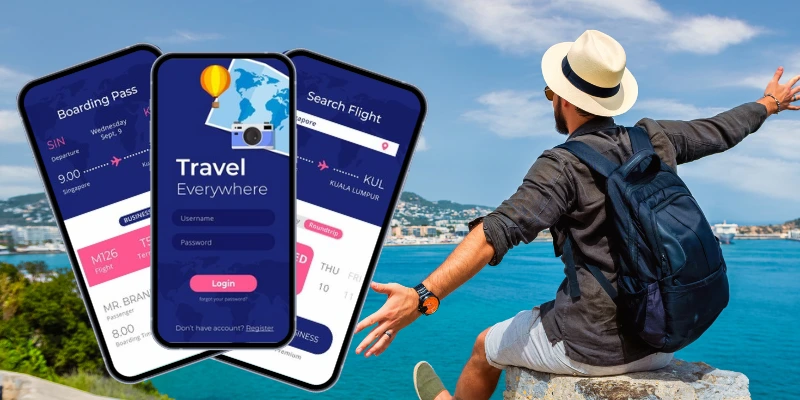One of the most important advancements in hotel booking has been mobile applications, which provide convenience and accessibility to customers globally. Thanks to these hotel booking app development services, users can easily find, compare, and book hotels on their phones while taking advantage of discounts and reviews from other travelers. This is the easiest way to have all your choices in one place; more than just a few taps are needed.
As an outstanding website development company, we follow trends and design smooth, user-friendly apps that are exceptional. This article provides information on features, development processes, and how one can make money. It provides a blueprint for firms wishing to enter this industry or developers wanting to leave their mark.
Trends Moulding the Hotel Booking App Development
Customization via ML and AI
Artificial intelligence and machine learning remain at the forefront of tailoring customer experiences. By understanding user behavior, preferences, and booking history, hotel booking apps can give personalized recommendations and relevant results at the most efficient level of the search process. This level of personalization enhances user satisfaction and loyalty since users feel understood and valued.
Rise in Sustainable Travel
Sustainability has grown from merely a buzzword to a movement. Travelers are increasingly sensitive to their environmental impact, searching for accommodations that align with their values. Applications that point out eco-friendly hotels suggest carbon offset options or support tourism, in general, are all related to sustainable travel and likely to appeal to an ever-growing market share of travelers.
VR and AR Experiences
Virtual and augmented reality are shaping how users find and select their accommodations. These technologies give an immersive view of what to expect by allowing virtual tours of rooms, hotels, and areas as a whole. Not only will this facilitate decision-making, but potential guests' excitement and engagement will increase, too.
Smooth Integration with Other Offerings
Incorporating other services, like car rentals, flights, and travel experiences, offers an ultimate solution for travelers, leading to enhanced app value. Such a holistic approach to travel planning would help ease the user's journey, from booking a flight to finding the perfect hotel and activities, all in one app.
Increased Mobile Payment Safety
After virtual payments have become the norm, guaranteeing safe and effortless transfers is paramount. It's also important to push through innovations in payment technology and security protocols to gain trust and get users to operate the apps regularly. One-tap payments, biometric authentication, and the processing of transactions through end-to-end encryption make a reservation much easier and more secure, thus giving peace of mind when booking.
AI Chatbots and Rapid Communication
It enriches the user experience by directly solving problems, answering questions, and making recommendations quickly through instant messaging or AI chatbots. Instant messaging capability guarantees that users are well supported at all stages of their path, from browsing to booking and beyond.
Kinds of Hotel Booking Apps
The ecosystem of the hotel booking app spans many diverse categories that service various travel and hospitality industry niches. Let us now examine the four primary categories for hotel booking apps:
Aggregator apps
Aggregator apps are all-around platforms that collapse listings from several hotels and accommodation providers to compare prices, amenities, and availability on one platform. Such applications use robust search and filter functionality to realize the best deals based on users' preferences. In addition, a massive amount of data is processed, which gives them insights into user behaviour, pricing trends, and market demand.
Chain Hotel Apps
These are designed by hotel chains and are oriented toward making bookings within their properties. They provide a smooth brand experience, from exploring hotels to reservation management and access to their loyalty schemes. Chain hotel apps often offer users special conditions, benefits, and personalized web development services, leading to customer loyalty and direct bookings.
Boutique Hotel Apps
Boutique hotel apps are tailored to a niche market that focuses on luxury spaces that provide exclusive experiences. These apps are likely concentrated on quality rather than quantity, highlighting the curated collection of hotels that attract travelers looking for design and special services. Boutique hotel booking app development services could also include virtual tours, detailed descriptions of the hotel's design and history, and reviews that showcase the feeling that each property is special.
Last-Minute Booking Apps
A hotel booking app development company dealing with the generation of last-minute booking apps offers essential discounts on the end hour bookings. They profit from unsold goods, benefiting hotels trying to fill rooms and consumers searching for discounts. Functionalities like geo-location services to look for hotels in the nearby range, instant booking processes, and flash sales are popular. The main roadblock for mobile app developers is algorithm creation that can adjust according to demand and inventory needs, ensuring people get access to all the best offers.
Standard Features of Hotel Booking Mobile App Development
A successful hotel booking app must improve the areas of user experience, ease of use, and value for money. Some of the key features in this direction are:
User-friendly interface and smooth navigation
The UI must be intuitive and simple to navigate. This would mean a clean design, logical flow, and ease of access to search and book so that the user can find what they are looking for without getting frustrated. It should also support different devices and screen sizes and provide a consistent user experience across all of them.
Advanced Search Filters
It is important to have a comprehensive search feature with several filters. Customers must be able to search for hotels by setting price range, location, ratings, amenities, etc. The search experience is improved even more by including date filters for check-in and check-out and by price, rating, or popularity sorting of results.
Detailed information and images
For every listing, provide details related to the hotel, such as facilities, description, policies, and a range of high-quality pictures. This helps in making informed decisions by giving a clear picture of what expectations should be raised during the stay.
Flexible booking process
The booking process must be simple and should require minimal steps. Multiple payment methods, including credit and debit cards, PayPal, and mobile wallets, should be allowed, with secure payment gateways to protect user information. In addition, allowing a user to change or cancel the booking from the application can be arguably a tremendous value-added feature for such applications.
User Feedback
Include a field for users to add reviews and hotel ratings. Bringing out a clear picture of the experience one can get. Users would have the ability to filter or sort hotels based on their reviews and ratings.
In-app support
Also, offer in-app support choices like FAQ sections, live chat, or chatbots that could help users in case of doubts or problems. Quick customer service enhances the overall user experience and can help resolve problems before they lead to negative reviews.
Loyalty schemes
Design and implement loyalty programs or rewards for frequent users regarding discounts, exclusive deals, or points that can be redeemed for free nights. It encourages repeat bookings and inculcates user loyalty to your app amidst the competition.
Push notifications
Use push alerts to inform users about deals, confirmations, reminders, etc. When utilised carefully and catered to the user's needs, this function can be an excellent tool for engagement and retention.
5 Common Hotel Booking Apps in the Market Today
We have listed the topmost hotel booking applications so you can learn about the services and apps offered. The reviews are based on the travel classifications of the Google Play Store and App Store.
1. Booking.com

Booking.com is the first app to top the list regarding hotel booking app development. The inclusion of a vast database of hotels provides a wide range of choices. The app's user interface is easy to browse and sleek, making it the most trustworthy among travellers. Apart from the standard features, such as finding and booking, it acquainted users with hotel details, reviews, and images. The software releases exclusive offers for users along with competitive prices.
2. Expedia

Expedia is another leading player in the sector. Expedia’s exclusivity comes from its feature of hotel bookings along with car rentals, flights, and travel itineraries. The app's standout functions are its loyalty scheme and rewards. Users can gain points on each significant booking made via the application, which can be redeemed for offers on upcoming bookings or free night stays at the chosen hotels. If you wish to design a hotel booking app, it can prove to be a one-stop solution for your clientele for trip planning.
3. Airbnb

Airbnb is a common instance of how to produce a hotel booking app to offer a satisfactory user experience. Complying with the unique idea of renting apartments and homes, Airbnb gives a distinct experience compared to conventional hotel booking app development services. The software enables customers to find relaxing homes in various destinations, offering a more tailored experience. The app features property listings, such as feedback and pictures, allowing users to make mindful decisions. Furthermore, Airbnb offers competitive rates and a chance to engage with local hosts for a validated travel experience.
4. Agoda

Agoda is one of the great mobile app development companies in the travel segment, specifically renewed in Asia, that offers people a remarkable booking experience. The app permits users to filter results according to several criteria, like facilities, region, cost range, etc. The app has collaborated with hotels and web development companies to advertise responsible travel. Customers can recognize and book eco-friendly stays via Agoda, leading to a sustainable future.
5. Kayak

Kayak is positioned at 5th place in the list of top-quality hotel booking app development solutions. It is a travel app that covers bookings, car rentals, itineraries, and flights. One of the app's special features is “Explore,” where users can discover new places according to their budget and travel preferences. By considering the demanded budget and travel dates, people can learn about different possibilities and hidden gems they might have been unaware of until now. The feature adds a pleasant element to the whole planning process, making Kayak a promising platform for strategizing hotel app development.
Advantages of Hotel Apps Development
Hotel booking app development is a strong move in the right direction concerning all parties involved, extending benefits to app hoteliers, guests, and app owners. Let’s delve deep into this.
Benefits for App Owners
The major reason for developing hotel apps is that you can produce handsome revenue if you fulfil the guests' requirements as required. What is significant to realise here is that you do not need to own a hotel to kickstart the development of a hotel booking app. For example, you can come up with a metasearch app and generate income through premium functions and commissions. Moreover, working in partnership with service providers helps produce an extra flow of income via referrals. A fully functional review system fosters trust, encouraging users to get attracted to your solution and, hence, enhancing business capitalization.
Benefits for Guests
Mobile app development services for hotel booking make it convenient for guests to look for solutions required while planning the trip and enable them to schedule everything within a few taps. In the era of gratification, this is a precious chance. Hotel booking technology that aids in remembering user preferences improves the booking experience. By recalling room locations and types ensures a more customised experience and a comfortable stay for customers. Imagine choosing your desired room with just a few clicks on your phone or having an app recommend nearby attractions, followed by your interests.
Benefits for Hoteliers
With the hotel booking application development, hotels can alert users via notifications, offer promotional deals, and promptly address queries. Hotel booking software is a medium that generates new streams of revenue for the hotel business. These apps can be created to offer extra features like in-app dining reservations, complimentary offerings, or room upgrades. By upselling these valuable services, hotels can enhance revenue on each post. Moreover, the apps can work with partner services such as transportation companies or tour operators, increasing the chances for income generation.
How to Earn Money Via Your Hotel Booking App
You are aware of how to create a hotel booking app and what features should be integrated. Now, it is time to think about the future and decide on a reliable monetization framework. Three fundamental models that can suit any app can be highlighted here.
Commission-based model
A commission-based model is a straightforward and popular monetization strategy for hotel booking website development. Here, the app acts as an agent between a hotel and its customers. Every time a user books a room through the app, the hotel pays a certain percentage of the booking amount to the app. This is a win-win model wherein the app generates revenue based on the volume of bookings generated. For the hotels, it opens up the chances of a broader customer base and more outstanding bookings.
Featured Advertisements and Listings
The featured ads and listings model charges hotels and other firms a fee for increased visibility in the application. Results can be pushed to the top of the search or placed in an especially designated area at the top of the page so more eyes will hit them. The app can also include ad spaces for hotels or other businesses related to them, like local attractions or tour operators. This allows hotels to differentiate in an overcrowded marketplace, bringing in more bookings while the app makes money from these premium placements.
In-App Upgrades
In-app purchases and upgrades allow users to buy additional features or services that enhance their booking experience. While the app's basic features, including searching for and booking a room, are free, users can purchase premium services. This may include access to special offers, booking rooms at the last minute, upgrading rooms, or other additional services like airport transfers or spa packages. By adding these extras, a mobile app development company will be able to provide a much more personalized experience by adapting it to users' different preferences and needs.
Affiliate Model
According to the affiliate model, the app coordinates with other web development companies in car rental, tours, and travel. This way, it earns a commission for bringing in high traffic and bookings. The app embeds affiliate links in its platform, assisting users in scheduling complementary services via the mentioned links. When a person initiates a booking through the link, the app is instantly credited with a commission charge from its significant partner. The model leverages the app’s old clientele to produce extra money without managing the services given by the partners. It provides an ultimate travel solution, allowing the app to benefit from a vast income stream.
Subscription Model
A company can hire dedicated developers to offer diverse premium functionalities in return for a certain subscription amount. The app can offer different subscription tiers, like monthly or annual plans, each offering different advantages. Subscribers would enjoy exclusive discounts, ultra-early access to special deals, priority customer support, and personalized booking experiences. This model ensures a stable, predictable revenue stream for the app since users agree to periodic payments to enjoy the advanced features. Additionally, this subscription model would create stickiness among customers since subscribers would use the app continuously to enhance their subscription’s value.
Process of Hotel Booking App Development
There are many stages to follow while developing a hotel booking application, which is important for making a successful and user-friendly app. Here, the whole process is explained in detail:
Market Planning
Comprehensive market research is the initial stage to grasp the target audience, their tastes, and their rivals. This includes examining current hotel booking applications, spotting market gaps, and figuring out original selling propositions. This study results in a thorough project plan that details the app's features, functionalities, and design criteria.
Identify Functionality
The app's essential elements are then specified. Typical elements are user registration and profiles, search and filter choices, booking and payment systems, user reviews and ratings, and customer service. Intricate elements such as in-app messaging, reward schemes, and tailored recommendations can also be included to improve the user experience.
User Experience and Design
During this phase, the app's design is being developed with an eye toward an appealing and easy-to-use UI. Prototypes and wireframes help one see the app's navigation and structure. The design of the user experience (UX) guarantees a flawless booking mechanism and simplicity of usage.
Development and Testing
This phase involves coding for a particular platform, like Android, iOS, or both. It involves front-end UI development and back-end development of the server’s end, managing databases, and integrating APIs. Throughout development, thorough testing is conducted to find and solve flaws, confirming the app's seamless operation on many devices and situations.
Third-Party Service Integration
A complete hotel booking app depends on including outside services such as mapping tools, payment gateways, and hotel databases. These connections give consumers a whole new booking experience and improve functionality.
Release of the App
Once the app is thoroughly tested and problems are overcome, it is ready for deployment. This involves setting up servers and databases and confirming that the app fulfils the necessary guidelines of the Android and iOS app stores. Post-deployment, the app is released and made public for the whole user base to install and use.
Post-Launch Upgrades and Assistance
In the period after launch, the app will require ongoing support to handle user-reported issues and push updates on newly added features or improvements. Regular updates keep it relevant and competitive in the market.
The Overall Cost of Hotel Booking App Development
The price of developing hotel booking application development services depends on numerous factors, like complexity, type of platform, and the locality of mobile app developers. Usually, the development process involves different stages, with each phase adding up to the complete price.
Initial planning and research involve market study, app requirements, and project planning. This can amount to a cost ranging from $5,000 to $15,000 based on the depth of the market study and how specific the plan is. Designing an attractive, easy-to-use interface (UI) is essential. This stage involves wireframes, mockups, and prototype design. Depending on complexity levels and customization degree, design costs vary from $10,000 to $25,000. Usually, the coding stage involves the most costly part of the app-making process.
Both front-end and back-end development are included in this process. A primary application with typical features like user registration, searching options, booking services, or payment integration can cost around $20,000 – $50,000. On the other hand, if you hire web developers who can include more complex functions like personalized recommendations, loyalty programs, or real-time chat support, prices can go up to about fifty thousand as well as a hundred thousand dollars or even higher. The app must undergo rigorous tests that confirm it has no bugs and operates smoothly. This may cost between $5,000 and $15,000.
Any additional external costs, such as engaging payment gateways and hotel databases, among other services, may increase the total amount to between five thousand and twenty thousand dollars. Additional devices may add an extra $5,000 to $20,000 to your overall expenditure.
Final Thoughts
Developing a hotel reservation application is similar to creating a passport for easy and smooth travel. The evolution of technology has changed how travellers find and secure lodging today because they can enjoy unlimited choices at their fingertips. We are not just following trends; instead, as a company that develops websites for clients, we create apps that provide users with a better experience than other developers in the same field.
We handle each step of product development very well by knowing what is happening in the market, having advanced features, such as tailored recommendations or virtual tours, and making it easy and secure to pay on mobile devices. Using these aggregator apps helps one get comprehensive comparisons, while boutique hotel applications provide exclusive features and last-minute bookings. Mobile platforms serve spontaneous travellers, among others. Therefore, different types of hotel booking applications suit everyone’s taste.
Furthermore, many ways to make money, including commission-based models and premium subscriptions, guarantee a continuous flow of income, which increases user satisfaction and retention rates. When developed properly, such an application will provide its users with a unique experience in hotel booking, thus enabling incredible strides in business growth. In short, creating a hotel booking app is more than just deploying software; it involves building networks between places and people and letting users explore places they never thought of.












Share this blog